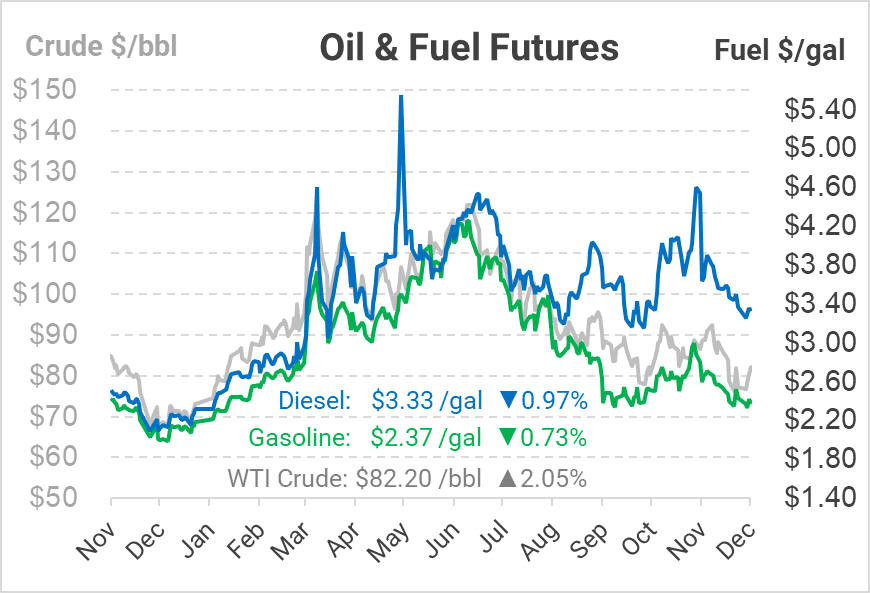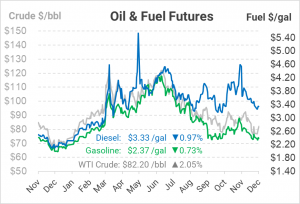
Off the Rails, Pt 2: What a Rail Strike Means for Fuel Buyers
In September, FUELSNews covered a possible rail strike that threatened to cost the US economy $2 billion per day while severely hampering the distribution of crude oil, renewable fuels, and DEF. Delays have kicked the can down the road, but now unions are threatening a strike on Dec 9.
With so much at stake, Congress is now getting involved. The House of Representatives approved two separate bills to force labor unions to accept the negotiated deal and provide rail workers with seven days of paid sick leave. The vote now goes to the Senate, which is expected to be much more hostile to intervention. So let’s refresh ourselves on how we got here and what a strike means for fuel and DEF markets.
How We Got Here
Tensions between rail workers and labor unions are not new. The heart of the issue is primarily tied to labor rates and time off. A proposal to increase rail workers’ pay, including a retroactive increase that would result in immediate catch-up payments to workers, has been supported by the administration and approved by several labor unions. But rail companies have been hesitant to grant paid sick leave, arguing that it interferes with efficient scheduling practices.
Twelve large labor unions have been negotiating with the rail majors, with different opinions on both sides. In July, President Biden used his executive power to institute a 60-day cooling-off period when labor unions were close to striking. This gave time for more negotiations, resulting in the package increasing pay. Although eight labor unions have ratified the agreement to increase pay, others have denied it. On Nov 21, four unions representing 60,000 workers voted against the package, bringing the threat of a strike back into force. When one union strikes, the other major unions will stand behind them to support their decision. The unions have given rail companies until December 9 to agree to their terms.
The House of Representatives voted yesterday with bipartisan support to force a deal and provide sick time to workers. But the Senate, which would require 60 votes to pass an agreement, could be more contentious. Senators on both sides of the aisle have threatened to block a vote. Some Senators argue that the government should not intervene in private affairs, and others argue that forcing an agreement unfairly removes those workers’ right to strike.
What This Means for Fuel Markets
As we wrote in September, the impact on crude oil and fuel prices will be minimal, though the combined timing of a rail strike and EU embargoes on Russia could bring a short-term crude oil supply crunch.
Biofuels would be more susceptible, and the renewables market has already seen tightness this year, especially on the biodiesel and renewable diesel side. However, local production improvements along with maritime shipments should help to keep markets supplied, as long as any potential rail strike does not last for an extended period.
Diesel Exhaust fluid could see a more severe impact. Per Jim Timmer, our Vice President of Diesel Exhaust Fluid, “Given the high usage of rail to service domestic consumers, a rail strike – if it lasts more than a few days – will significantly impact the US and Canadian DEF market. Mansfield is increasing DEF inventory in all available markets to ensure we can meet our customers’ needs during any short-term disruptions.” Chemicals must stop shipment days before a strike, so ammonia shipments (a key ingredient in DEF) will cease on December 4.
In September, a strike was averted with mere hours to spare. If the same thing occurs this time, markets may see some temporary outages but will spring back quickly. A prolonged strike is unlikely given Congressional intervention, but it is possible. Mansfield will continue monitoring the situation closely to determine what impacts, if any, are expected for fuel and DEF markets.
This article is part of Daily Market News & Insights
Tagged: Biodiesel, crude, DEF, Diesel Exhaust Fluid, ethanol, Rail Strike, renewable diesel, Renewables
MARKET CONDITION REPORT - DISCLAIMER
The information contained herein is derived from sources believed to be reliable; however, this information is not guaranteed as to its accuracy or completeness. Furthermore, no responsibility is assumed for use of this material and no express or implied warranties or guarantees are made. This material and any view or comment expressed herein are provided for informational purposes only and should not be construed in any way as an inducement or recommendation to buy or sell products, commodity futures or options contracts.






